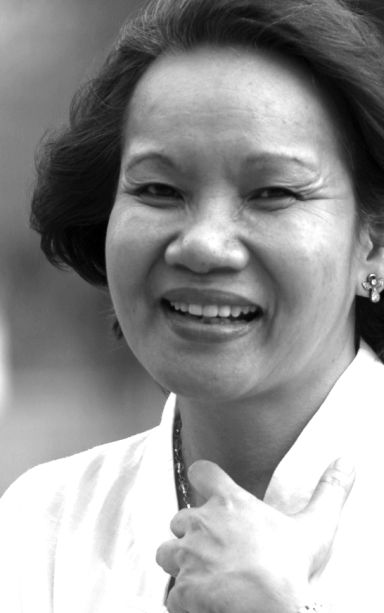
LOGARTA
Many images show them clutching their children wanting to shield them from this horrible disturbance in their lives. Then they run or walk great distances to bring them to shelters. Here, they still face many problems.
Here with the crowd, they fear that the good health of their children is threatened.
The anxiety increases with children getting sick due to contaminated food. Others have even died. Many worry over family members left in the war zones. So they keep asking: when is this going to end?
Even females not within the vicinity of the war suffer. Mothers and wives of soldiers are in distress over loved ones. One mother had not seen her son for years; when she finally gets to see him, he is now in a coffin. Another woman is heartbroken, for the father of the child still in her womb has been killed in battle.
The children and youth suffered from the interruption of their studies. For some time, a group of students had been trapped. Many school buildings have been destroyed in the conflict.
The entire country joined the Muslims in their celebration of the culmination of the Ramadan in Eid al-Fitr. In spite of the terrible conditions, they proceeded with the fast and prayers; they even exerted effort to actually celebrate! Some could not resist declaring: they stole Ramadan and Eid al-Fitr!
The solidarity that emerged from the crisis was soothing. Let us sustain this “with-ness” and strengthen it with continued vigilance — be on the alert that the points in the succeeding resolution are actually followed. The lead signatories were: Presidential Adviser for the Peace Process Jesus G. Dureza, Philippine Commission on Women Chair. Rhodora M. Bucoy and Department of the Interior and Local Government Representative Catalino S. Cuy.
“NOW, THEREFORE, BE IT RESOLVED by the National Steering Committee on Women, Peace and Security (NAPWPS) that the following shall be observed in the conflict management, conflict resolution, and implementation of humanitarian action in the crisis in Marawi City and the whole of Mindanao:
“1. Ensure that all persons, especially women, children, the elderly, and persons with disabilities, affected and displaced by armed conflict are protected from all forms of gender-based violence, particularly rape, sexual abuse, sexual harassment, and trafficking, and all other forms of violence in situations of armed conflict;
“2. Provide gender- and culture-sensitive quick response (QR) humanitarian relief and assistance to displaced women and children, including provisions for food and non-food items, hygiene and family packages, and segregated latrines; …
“5. Provide comprehensive gender- and culture-sensitive humanitarian rehabilitation and recovery program with particular focus on shelter, health, social health insurance, livelihood, and educational support;
“6. Collect age- and sex-disaggregated data on affected population, and identify groups with specific needs, such as single-headed households, and unaccompanied and separated girls and boys. …
“10. Ensure women’s participation and representation in conflict management, conflict resolution and peacemaking bodies.”
Space limitations have caused us to quote only certain key points.
Disclaimer: The comments uploaded on this site do not necessarily represent or reflect the views of management and owner of Cebudailynews. We reserve the right to exclude comments that we deem to be inconsistent with our editorial standards.




